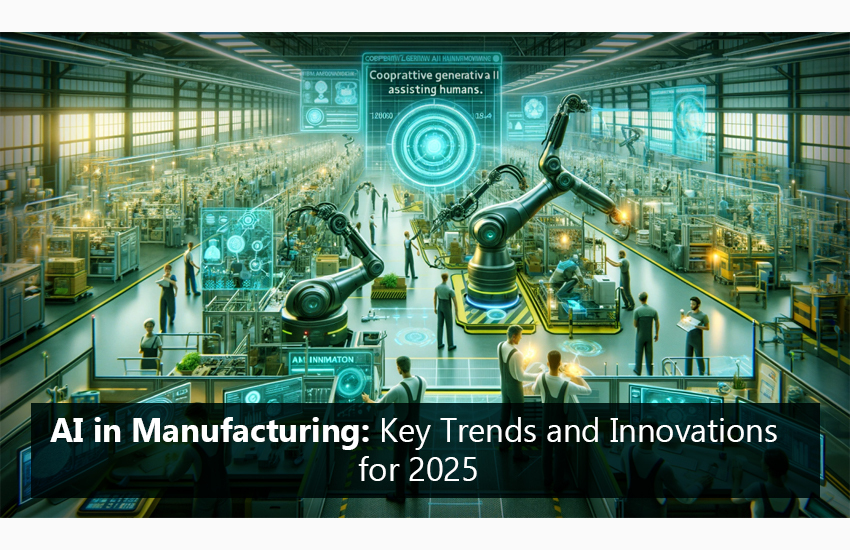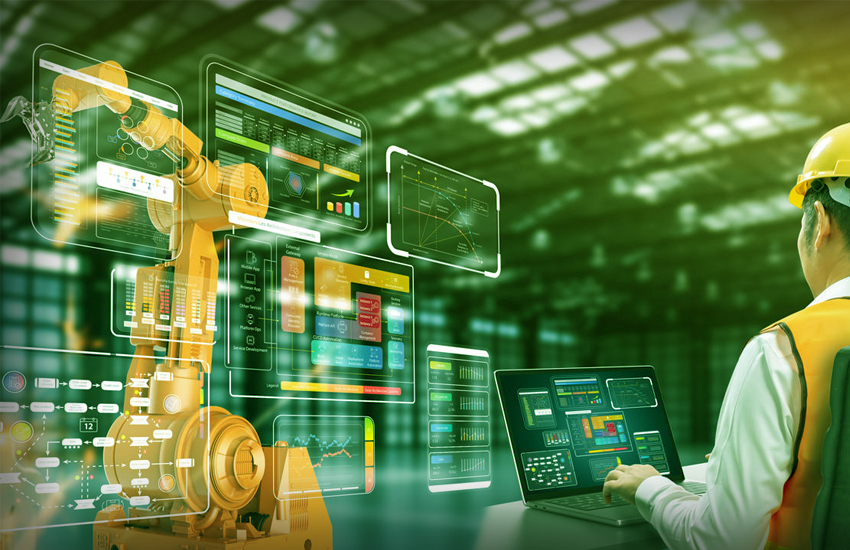
AI in Manufacturing is at the front of the technological change taking place in the manufacturing sector. Businesses are reaching previously unthinkable levels of accuracy, productivity, and efficiency by combining advanced automation with artificial intelligence in manufacturing.
It is anticipated that the use of AI Manufacturing Solutions would increase even more in 2025, giving producers the ability to automate difficult processes, make better decisions, and improve customer satisfaction by producing dependable, superior goods. By providing innovative AI for manufacturing industry that meets changing market demands, companies such as Modelcam Technologies are setting the standard.
This year, let's examine the major developments and trends influencing AI in manufacturing.
Smart Manufacturing with AI is revolutionizing factory operations. Production lines may learn, adapt, and self-optimize by incorporating Industrial Artificial Intelligence into their machinery. Large volumes of sensor data are processed by these AI-powered systems in order to identify trends, anticipate malfunctions, and make real-time operational adjustments.
With this change, industrial automation is moving from classical automation to AI in industrial automation, where robots can "think" and "decide" in addition to being controlled. Without continual human interaction, it enables producers to increase output, minimize waste, and maximize uptime.
AI-driven solutions that integrate robotics, sensors, and data automation are being implemented by businesses such as Modelcam in order to promote operational excellence.
To get more knowledge about smart manufacturing with AI, read our informative blog post, “How AI in Manufacturing Is Transforming Industrial Automation”!
The quick development of deep learning and machine learning is one of the main factors accelerating AI in manufacturing. By learning from historical data, these technologies allow robots to continuously improve their performance.
For instance, machine learning models can estimate demand, optimize inventory, and plan maintenance schedules, while deep learning-based AI applications may evaluate visual data to identify minute flaws during manufacturing.
AI manufacturing solutions that must quickly adjust to changing consumer demands and market volatility are increasingly dependent on such intelligent systems.
AI in Production has significantly increased operational efficiency in production operations. Businesses are attaining quicker turnaround times and better product quality by implementing AI for manufacturing industry operations including scheduling, load balancing, and workflow optimization.
By spotting trends in comments pertaining to manufacturing, AI systems also improve the study of consumer data. This enhances the customer experience by assisting manufacturers in modifying designs and production factors to satisfy evolving client demands.
Even mid-sized manufacturers are starting to include AI technology at different phases of manufacturing as the technology becomes more widely available.
Strict quality checks are necessary for high-precision manufacturing, and (artificial intelligence) AI in quality control and inspection is revolutionizing this crucial field. AI systems that are based on vision can quickly analyze product photos and spot defects that are not evident to the human eye.
In addition to lowering human error, these solutions offer real-time notifications to stop faulty batches. They provide useful insights that improve AI in industrial automation operations when paired with data analysis.
Manufacturers are able to increase brand recognition, establish trust, and guarantee consistency as a result.
Predictive maintenance is among the most significant AI use cases in manufacturing. AI for predictive maintenance in manufacturing can identify wear and tear indicators long before failures happen by tracking equipment conditions and evaluating sensor data.
This prolongs equipment life and reduces expensive downtime. AI-driven algorithms are used by these AI manufacturing solutions to plan maintenance on time, distribute resources effectively, and facilitate improved financial planning.
Predictive maintenance is a straightforward method for manufacturers to increase operational continuity and maximize return on investment.
The complexity of global supply systems is rising, and interruptions can be expensive. Real-time logistics optimization, inventory balancing, and disruption prediction are all made possible by (artificial intelligence) AI in supply chain management.
Artificial intelligence in manufacturing improves decision-making in manufacturing supply chains by guaranteeing more visibility from the sourcing of raw materials to delivery.
Tighter connection between sales, production, and distribution is made possible by supply chain AI when paired with CRM AI and sales automation solutions.
Generative AI in manufacturing is another fascinating advancement that is enabling businesses to innovate more quickly. In a virtual setting, generative AI technologies may verify the structural integrity of new product ideas, simulate them, and optimize material utilization.
This enables manufacturers to bring items to market more quickly by accelerating R&D cycles and cutting expenses. Generative AI enhances competitive differentiation and strategic innovation when integrated with AI in business.

Looking ahead, increased integration of interconnected systems and ongoing developments in AI technology will influence the future of AI in manufacturing. Factories will develop into completely self-sufficient ecosystems where AI in industrial automation works in harmony with human knowledge.
AI-driven decision-making, data automation, and AI use cases in manufacturing that dynamically adjust to market demands will be key components of data-driven manufacturing settings.
Adopting AI manufacturing solutions will become crucial for resilience and growth as Industry 4.0 develops; it will no longer be a choice. By guaranteeing the quality and dependability of their products, businesses that use smart manufacturing with AI will not only increase productivity but also provide better customer service.
AI in manufacturing is revolutionizing the design, production, and delivery of goods. AI in supply chain and production are two examples of how these technologies are enabling more sustainable practices, cost savings, and better operations.
Businesses can confidently embrace this transition because of companies like Modelcam Technologies, which are leading the way in AI applications for the industrial sector.
Unprecedented innovation will be fueled by the convergence of data analysis, machine learning, and industrial artificial intelligence as 2025 goes on. The future of the manufacturing sector will be shaped by companies that take action today and make investments in artificial intelligence in manufacturing.
Let’s connect: www.modelcamtechnologies.com
Email: sales@modelcamtechnologies.com
Mobile no : +91 8237016167
©Copyright 2025. All rights reserved by Modelcam Technologies Private Limited PUNE.